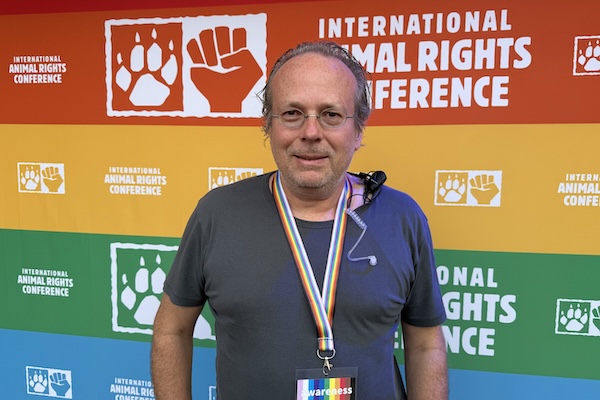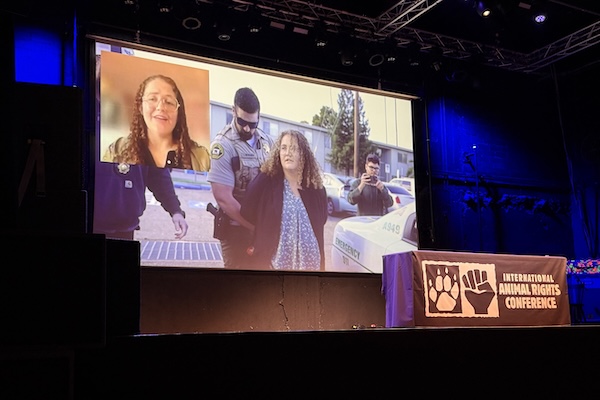 Heiko Weber, IARC co-founder;
Credit: Ievgenii Karanov, Chronicle.lu
Heiko Weber, IARC co-founder;
Credit: Ievgenii Karanov, Chronicle.lu
From Thursday 4 to Sunday 7 September 2025, the International Animal Rights Conference (IARC) 2025 is taking place at the Kulturfabrik in Esch-sur-Alzette, with around 300 participants in total, both on site and online.
According to IARC co-founder Heiko Weber, the main goal of the conference is “to bring different people from the animal rights movement here to present their campaigns and share both theoretical and practical perspectives, while also welcoming those who are simply interested in animal rights.” He told Chronicle.lu that the four-day event features workshops, film screenings and evening activities, with around 50 speakers contributing on site and online.
Mr Weber noted that over the past decade, significant progress has been made in the field of animal rights and plant-based lifestyles. “The main change is that there’s a lot more vegan food. Twenty years ago, if you went to a supermarket, restaurant or even on a train, you would not get any vegan options. Now it’s very easy,” he said, adding that this has been one of the most visible improvements.
He also pointed to wider regulatory advances, such as the EU ban on animal testing for cosmetics. “There’s progress. Of course, it’s not ideal … many in the animal rights movement feel it is going way too slow. But there are clear signs that it’s moving in the right direction.”
Speaking about Luxembourg and Western Europe more broadly, Weber highlighted a shift in dietary patterns. Meat consumption has been declining steadily for more than a decade, while plant-based alternatives such as oat milk are increasingly replacing cow’s milk. “There’s definitely a shift to a more plant-based diet, which is very important, because most animals are killed for food production,” he told Chronicle.lu.
One of Saturday’s sessions focused on “How Animal Rescue Can Change the World”, delivered online by Zoe Rosenberg, founder of Happy Hen Animal Sanctuary (California), which has rescued more than 1,000 farm animals.
According to Ms Rosenberg, open rescue means removing animals from abuse “in a very open, above-ground way … we’re not hiding our faces; we document everything and share their stories”. She stressed that “all animal rescue work is important”, noting that open rescue complements both traditional shelter work and covert operations.
Illustrating the point, she recounted the 2023 case of River, a duck found “on his back, bleeding and unable to right himself” at a Sonoma County factory farm. After veterinary care, River recovered; telling his story, she argued, helped audiences connect with “one individual” rather than becoming desensitised by mass suffering: “When you zoom in on one animal, people start to root for them … and recognise that every animal has a life worth living.”
Ms Rosenberg also outlined the strategic reasons for visibility, “the media is very human-centric; showing our faces helps get animals’ stories told”, and the potential legal implications of “necessity” defences in US courts that could, in certain circumstances, recognise animals as “someone” harmed. She referenced her ongoing case linked to investigations at Petaluma Poultry, saying the publicity and court process have mobilised support and prompted businesses to reassess supplier ties.
Closing with practical advice, she urged prospective rescuers to seek training, follow strict biosecurity and animal-care protocols, and “document everything - from conditions to veterinary treatment - so these stories can effectively reach people.”
The International Animal Rights Conference 2025 will conclude on Sunday 7 September, with sessions scheduled from 09:50 to 15:00. Topics will include the history of animal rights campaigning, the impact of the pet food industry, tackling animal abuse in the Caribbean, strategies for ending animal testing and creative approaches to activism.
(Caption: Zoe Rosenberg speaking online at the International Animal Rights Conference 2025; Credit: Ievgenii Karanov, |Chronicle.lu)









